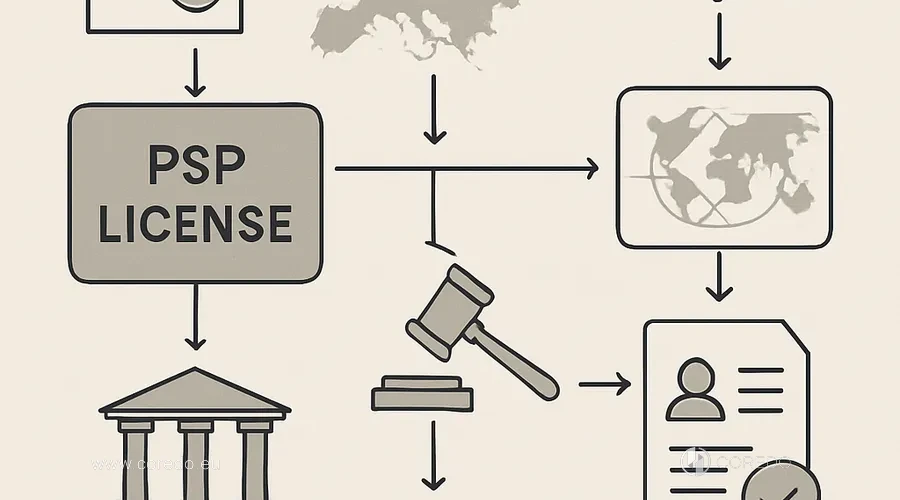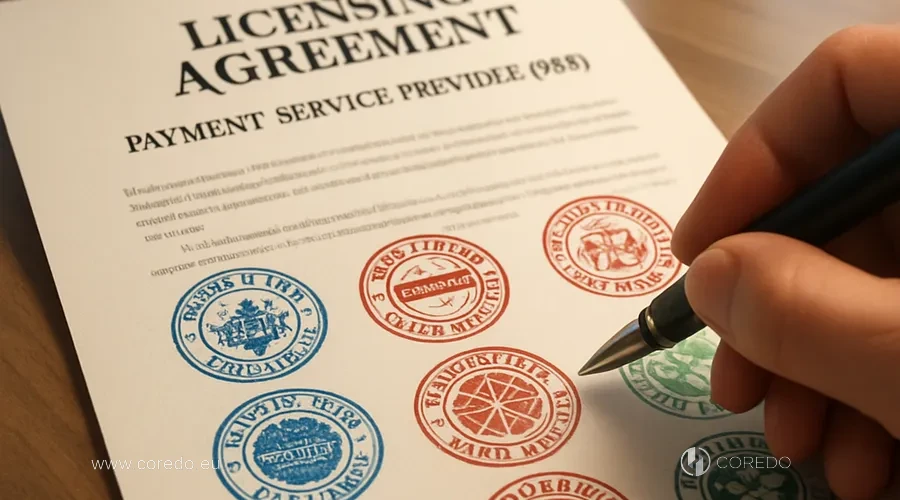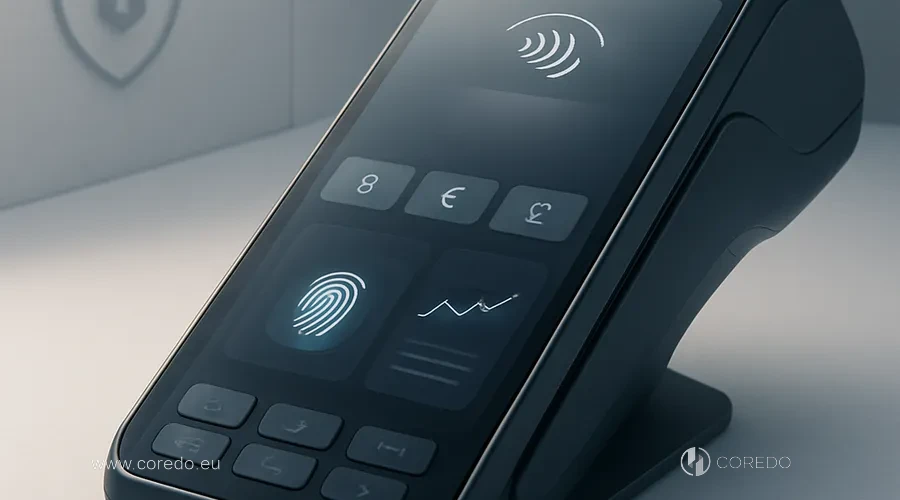Who needs a PSP license?
Over the past years the COREDO team has implemented dozens of projects for fintech companies, startups, payment aggregators, e-money providers and international payment services. PSP license for business is necessary for those who:
- Develop fintech products, payment platforms and aggregators.
- Provide e-wallets, payment gateways and services for digital transfers.
- Are focused on international operations and working with individuals and legal entities worldwide.
- Implement solutions for integration with banks and banking partnerships.
- Conduct transactions involving e-money, cryptocurrencies and digital services.
Benefits of a PSP license
The solution developed by COREDO for international clients demonstrates that a PSP license in the EU provides unique advantages:
- Legality: compliance with strict regulatory requirements.
- Passporting: the ability to operate in all EU/EEA countries without obtaining separate licenses.
- Access to banking partnerships: integration with leading banks and financial institutions.
- Expansion of the customer base: serving individuals and legal entities, scaling the business.
- Reduction of operational costs: process optimization, no need for multiple licenses.
Main requirements for obtaining a PSP license

Financial requirements and minimum capital
In different jurisdictions the minimum capital for a PSP license varies significantly. Below is a table reflecting the current requirements:
| Jurisdiction | Service type | Minimum capital |
|---|---|---|
| Belize | Money transfers | €20,000 |
| Belize | Transactions with confirmations | €50,000 |
| Belize | Full range of payment services | €125,000 |
| UAE (Dubai) | Money transfers (Category 4) | $140,000 |
| UAE (Dubai) | Payment accounts and instruments (3D) | $200,000 |
| UAE (Dubai) | Wallet services (Category 3C) | $500,000 |
| Liechtenstein | Payment services | Individually |
Corporate requirements and governance
To register a PSP in most countries, the following are required:
- At least two directors (often one must be a resident of the country).
- A clear corporate governance system.
- Distribution of responsibilities among governing bodies.
- Implementation of procedures to oversee operational risks.
- An official procedure for handling customer complaints.
- An IT monitoring system.
Staff and insurance requirements
Regulators require:
- Hiring qualified staff with experience in financial services.
- Mandatory professional insurance.
- Checks of competence and business reputation of executives.
Reporting and audit requirements
To obtain a license for payment services the following are required:
- Timely financial reporting.
- Audit by a licensed auditor.
- Regular audits and compliance with international standards (IFRS, GAAP).
Documents and Business Plan for a PSP License

Legal Documents
Clients of COREDO receive a detailed checklist that includes:
- Memorandum of Association (MOA), Articles of Association (AOA).
- Certificate of company registration.
- Identity documents of shareholders and directors.
- Information on beneficial owners.
- Professional and personal references for executives.
Financial Documents
In each COREDO case, emphasis is placed on:
- Audited financial statements.
- Proof of sufficient capital (bank statements).
- Demonstration of net asset value.
- Transparency of financial operations.
3-Year Business Plan
The PSP business plan, a strategic document reflecting:
- Description of payment services.
- Methods of service delivery.
- Target markets and customer base.
- Financial forecasts and expected transaction volumes.
- Revenue and cost structure.
- Growth scenarios and risk management.
Program Document and Description of Activities
In each project COREDO prepares a program of activities that includes:
- Methods of service delivery.
- Description of internal procedures and policies.
- Security policy and incident response mechanisms.
AML and KYC Documents
To successfully obtain a PSP license the following are required:
- Detailed AML procedures and CFT.
- Evidence of meeting compliance requirements.
- Risk management plans.
Technological Documents
Special attention is paid to:
- Description of software and technological infrastructure.
- Ensuring the security of payment gateways.
- Data protection and reliability of payment processing.
Obtaining a PSP license by jurisdiction: step-by-step

Obtaining a PSP license in the EU
A PSP license in the EU is an opportunity to operate in all EU/EEA countries thanks to the passporting principle. A unified regulatory framework reduces operating costs and simplifies scaling. In COREDO’s practice the most in-demand jurisdictions for registering PSPs and obtaining a license for cross-border operations are Liechtenstein, Malta and Cyprus.
PSP license in Liechtenstein: Guide
Regulator – FMA (Financial Market Authority). The process consists of:
- Preparation of documentation: operating program, three-year business plan, confirmation of authorized capital, organizational chart, security policy.
- Submission of the application: gathering the full document package and submitting it to the FMA.
- Checks and analysis: document assessment, compliance review, analysis of the business reputation of executives.
- Receiving the decision: issuance of a decision to grant the license.
- Registration: inclusion in the FMA’s official register.
Obtaining a PSP license in Belize
Regulator: IFSC. The process includes:
- Company registration with a memorandum of association (MOA) reflecting the activities.
- Preparation and submission of documents: legal documents, financial statements, business plan, proof of address, references for executives, AML and CFT procedures.
- Structural requirements: at least two directors (one local), qualified personnel, insurance, a physical office.
- Financial requirements: €20,000–€125,000 depending on the type of services.
- Review and approval: IFSC document review, obtaining the license.
Obtaining a PSP license in Dubai
Regulator: Central Bank of the UAE. License categories differ by capital and type of services.
- Assessment of operational activity: compliance with local laws.
- Compliance criteria: company registration, infrastructure, capital.
- Preparation of documents: business plan, confirmation of AML/KYC, incorporation documents, personal data of shareholders and directors.
- Application submission: sending to the Central Bank.
- Review and approval: application analysis, obtaining the PSP license.
- Compliance with requirements: regular audits, reporting, compliance.
PSP license in Mauritius
Regulator: Financial regulator of Mauritius.
- Preliminary preparation: business model analysis, compliance with requirements, strategic plan.
- Document collection: business plan, financial statements, information on beneficial owners and directors.
- Compliance and financial checks: proof of financial stability, capital, risk management, audit.
- Description of internal procedures: AML/CFT policies, technological infrastructure.
- Application submission: sending documents, review, obtaining the license.
PSP Licensing by Jurisdiction

Comparison Table of Jurisdiction Parameters
| Parameter | Liechtenstein (EU) | Belize | UAE (Dubai) | Mauritius |
|---|---|---|---|---|
| Regulator | FMA | IFSC | Central Bank of the UAE | Financial regulator |
| Minimum capital | Individually | €20,000–€125,000 | $140,000–$500,000 | Individually |
| Director requirements | Not specified | 2+ (1 local) | Not specified | Not specified |
| Physical office | Required | Required | Required | Required |
| Passporting | Yes (EU/EEA) | No | No | No |
| Licensing timeline | 3–6 months | 2–4 months | 2–6 months | 3–6 months |
| Process complexity | High | Medium | Medium | Medium |
| Cost | €5,000–€15,000 | $3,000–$8,000 | $5,000–$15,000 | $3,000–$10,000 |
Advantages and Disadvantages of Jurisdictions
- Liechtenstein (EU)
- Passporting to the EU/EEA, high level of regulation, access to European banks.
- Significant resources and a complex licensing process are required.
- Belize
- Low capital requirements, fast process, low costs.
- No passporting, less international trust, a physical office is required.
- UAE (Dubai)
- Strategic location, developed infrastructure, high level of regulation.
- High capital requirements, office maintenance costs, lack of passporting.
- Mauritius
- Strategic position, developed system, low costs.
- Limited access to European banks, no passporting.
Choosing a Jurisdiction for Business
- For operating in Europe — Liechtenstein or EU countries.
- For Asia and the Middle East — UAE (Dubai).
- For Africa — Mauritius.
- For startups with limited budgets — Belize.
- For international operations: a combined approach.
Special requirements for payment services

PSP license for money transfers
PSP license for e-wallets
PSP license for payment aggregators and gateways
PSP license for cryptocurrencies
PSP license for individuals and legal entities
Timelines, costs, and mistakes of PSP licensing
Timelines for obtaining a PSP license by country
- Liechtenstein: 3–6 months.
- Belize: 2–4 months.
- UAE: 2–6 months.
- Mauritius: 3–6 months.
Cost of a PSP license and its maintenance
- Government fees: €3,000–€15,000.
- Consulting services: individually.
- Office maintenance, insurance, audit – from $3,000 to $10,000 per year.
Common mistakes when applying for a PSP license
- Incomplete document preparation.
- Insufficient capital.
- Weak business model.
- Inaccurate description of activities.
- Absence of AML/KYC procedures.
- Choosing the wrong jurisdiction.
- Underestimating regulator requirements.
How to avoid a license refusal
- Thorough preparation of documents.
- Consultation with COREDO experts.
- Choosing the optimal jurisdiction.
- Demonstrating financial stability.
- Developing a reliable business model.
- Compliance with all regulator requirements.
PSP license or EMI license: which to choose?
PSP and EMI: what’s the difference?
PSP (Payment Service Provider) — a payment services provider not required to hold clients’ funds. EMI (Electronic Money Institution) — an electronic money institution that can issue and hold electronic money, subject to higher capital and security requirements.
PSP and EMI comparison table
| Parameter | PSP | EMI |
|---|---|---|
| Main function | Payment processing | Issuing electronic money |
| Holding funds | Not required | Required |
| Minimum capital | Lower | Higher |
| Security requirements | Medium | High |
| Funds insurance | Not required | Required |
| Passporting | Yes (EU/EEA) | Yes (EU/EEA) |
| Licensing complexity | Lower | Higher |